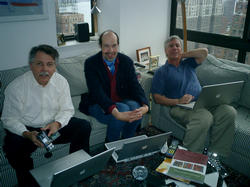|
This is my dynamic, frequently updated homepage. This is a NewsLog, also known as a WebLog or Blog.
Everything is evolving, so don't assume too much.
People to watch:
Adina Levin
Andrius Kulikauskas
Britt Blaser
Catherine Austin Fitts
Chris Corrigan
Clay Shirky
Dan Gillmor
Dave Pollard
David Allen
David Weinberger
Dewayne Mikkelson
Dina Mehta
Doc Searls
Elisabet Sahtouris
Elizabeth Lawley
Euan Semple
Florian Brody
Frank Patrick
Gen Kenai
George Dafermos
George Por
Graham Hancock
Greg Elin
Hazel Henderson
Heiner Benking
Inspector Lohman
Jean Houston
Jerry Michalski
Jim McGee
Jim Moore
John Abbe
John Perry Barlow
John Robb
Joi Ito
Jon Husband
Jon Lebkowsky
Jon Udell
Jonathan Peterson
Judith Meskill
Julian Elvé
Julie Solheim
Kevin Marks
Lawrence Lessig
Leif Smith
Letecia Layson
Lilia Efimova
Lisa Rein
Marc Canter
Mark Oeltjenbruns
Mark Pilgrim
Mark Woods
Martin Dugage
Martin Roell
Mary Forest
Matt Mower
Max Sandor
Michael Fagan
Mike Owens
Mikel Maron
Mitch Kapor
Mitch Ratcliffe
Nathalie dArbeloff
Netron
Noam Chomsky
Paul Hughes
Peter Kaminski
Phil Wolff
Philippe Beaudoin
Ray Ozzie
Raymond Powers
Rebecca Blood
Roger Eaton
Roland Tanglao
Ross Mayfield
Scott Lemon
Sebastian Fiedler
Sebastien Paquet
Skip Lancaster
Spike Hall
Steven Johnson
Stuart Henshall
Thomas Burg
Thomas Madsen-Mygdal
Thomas Nicholls
Timothy Wilken
Todd Suomela
Tom Atlee
Tom Munnecke
Tom Tomorrow
Ton Zijlstra
Lionel Bruel
Loic Le Meur
Nancy White
Mark Frazier
Merlin Silk
Robert Paterson
Colby Stuart
Nova Spivack
Dan Brickley
Ariane Kiss
Vanessa Miemis
Bernd Nurnberger
Sites to watch:
Edge
Junto
Absara
Rhizome
Nanodot
HeadMap
Openworld
FutureHi
Imaginify
Do No Harm
BoingBoing
Smart Mobs
Webcamorama
MetaFilter
NotThisBody
Disinfopedia
YES Magazine
Collective Web
WorldChanging
Disinformation
Escape Velocity
Space Collective
Friendly Favors
Emergent by Design
Independent Media
Global Ideas Bank
Forbidden Science
Greater Democracy
ThoughtsOnThinking
Disclosure Project
Explorers Foundation
Manufacturing Dissent
Collective Intelligence
Action without borders
Free Expression Network
Co-intelligence Institute
Electronic Frontier Foundation
French:
Emmanuelle
Manur
Elanceur
Loeil de Mouche
IokanaaN
Blog d'Or
Le Petit Calepin
GeeBlog
Absara
Guillaume Beuvelot
Ming Chau
Serge Levan
Jean Michel Billaut
C'est pas Mécanique

I live in Toulouse, France where the time now is:
01:06
Unique Readers:

Primarily
Public Domain
Everything I've written here is dedicated to the
Public Domain.

The quotes from other people's writings, and the pictures used might or might not be copyrighted, but are considered fair use. Thus, overall, this weblog could best be described as being:
Primarily Public Domain. |
Syndication:
 ![Validate my RSS feed [Valid RSS]](http://www.newciv.org/pic/valid-rss.png)
|
| Friday, May 30, 2003 |  |
|
|
|
 Better than a card deck of wanted Iraqi officials, here's now the War Profiteer Card Deck. It exposes some of the real war criminals in George W's war on terror. Spades: oil, gas, energy. Hearts: US government officials. Clubs: military/defense contractors. Diamonds: heads of industry, media, policy, and hype. Via Karen Marcelo at BoingBoing. Better than a card deck of wanted Iraqi officials, here's now the War Profiteer Card Deck. It exposes some of the real war criminals in George W's war on terror. Spades: oil, gas, energy. Hearts: US government officials. Clubs: military/defense contractors. Diamonds: heads of industry, media, policy, and hype. Via Karen Marcelo at BoingBoing.
[ Information | 2003-05-30 00:09 | | PermaLink ] More >
|
|
|
|
Lisa Rein mentions a Christina Science Monitor article about the remains of toxic bullets that litter Iraq. Now, there is good journalistic work. Instead of just writing what they're supposed to, they actually send somebody there with a geiger counter, to check the level of radioactivity for themselves.At a roadside produce stand on the outskirts of Baghdad, business is brisk for Latifa Khalaf Hamid. Iraqi drivers pull up and snap up fresh bunches of parsley, mint leaves, dill, and onion stalks.
But Ms. Hamid's stand is just four paces away from a burnt-out Iraqi tank, destroyed by - and contaminated with - controversial American depleted-uranium (DU) bullets. Local children play "throughout the day" on the tank, Hamid says, and on another one across the road.
No one has warned the vendor in the faded, threadbare black gown to keep the toxic and radioactive dust off her produce. The children haven't been told not to play with the radioactive debris. They gather around as a Geiger counter carried by a visiting reporter starts singing when it nears a DU bullet fragment no bigger than a pencil eraser. It registers nearly 1,000 times normal background radiation levels on the digital readout.
The Monitor visited four sites in the city - including two randomly chosen destroyed Iraqi armored vehicles, a clutch of burned American ammunition trucks, and the downtown planning ministry - and found significant levels of radioactive contamination from the US battle for Baghdad.
[ News | 2003-05-30 23:59 | 0 comments | PermaLink ]
|
|
|
|
From The Guardian:The good news for the Pentagon yesterday was that its investigators had finally unearthed evidence of weapons of mass destruction, including 100 vials of anthrax and other dangerous bacteria.
The bad news was that the stash was found, not in Iraq, but fewer than 50 miles from Washington, near Fort Detrick in the Maryland countryside.
The anthrax was a non-virulent strain, and the discoveries are apparently remnants of an abandoned germ warfare programme. They merited only a local news item in the Washington Post. Nobody was able to find any documentation about disposed biological agents at the US bio-defense center at Fort Detrick. Hm, seems like those guys in Iraq were much better at keeping records.
[ News | 2003-05-30 23:59 | 0 comments | PermaLink ]
|
|
| Thursday, May 29, 2003 |  |
|
|
|
 Yesterday I was watching GIFTING IT: A Burning Embrace of Gift Economy, which is a documentary about the gift economy in effect at BurningMan, which I mentioned here. Somebody said: Yesterday I was watching GIFTING IT: A Burning Embrace of Gift Economy, which is a documentary about the gift economy in effect at BurningMan, which I mentioned here. Somebody said:You could almost say that the definition of community is a place where there's gift giving.
The converse of that would be that if you want to destroy community, a good way of doing it is to turn all gift giving into commercial exchanges. Right. I agree. It is like in a family. Wouldn't work if we had to account for and pay for each act. My baby daughter would have had no money to pay for her upbringing. Lots of little joyful or necessary acts would just have been so much harder if we had had to go out and get financing for them. Likewise in any community of people who aren't just family. What brought them together might well have been a commercial relationship. But what holds them together, and what makes the community useful is all the extra stuff they do together which they didn't necessarily have to do.
Economics is not so much about money as it is about making choices. In gift economies it is all about choices. Communities form when a bunch of people somehow choose to operate together. It is better the more informed their choices are. Taking away the ability to choose, or the ability to choose well, destroys community and is also bad economics.
[ Organization | 2003-05-29 23:31 | | PermaLink ] More >
|
|
|
|
 Mark Frauenfelder of BoingBoing is moving from Los Angeles to Rorotonga in the South Pacific next month with his wife and two young daughters. Wow, very cool and adventurous. They will be chronicling their adventure at The Island Chronicles. Mark Frauenfelder of BoingBoing is moving from Los Angeles to Rorotonga in the South Pacific next month with his wife and two young daughters. Wow, very cool and adventurous. They will be chronicling their adventure at The Island Chronicles. We want to find out what it is like for us, an urban American family – accustomed to 24-hour supermarkets, multiplex theaters, top quality medical care, freeways, high-rises, thousands of restaurants in a 20-mile radius, and a daily barrage of media – to slow down. So we moved to the South Pacific. Our first stop is Rarotonga, a tiny island in the South Pacific.
It's a big change for us. We'll be staying on a land mass that’s 99.9993 percent smaller than the United States. It means living among wild dogs, pigs and roosters (which run freely on the island), instead of screaming car alarms, smog-belching Hummers, and random incidents of road rage. It means spending long, sultry afternoons wandering through the rainforest as an after-school activity, rather than sitting in traffic on the 30-minute drive home from school, only to rush through computer games and indoor 'playdates' with other friends. It means picking mangos and breadfruit, buying taro root and coconuts from the front porches of people’s houses, and fishing for supper, rather than zapping a frozen gardenburger in the microwave the moment hunger strikes. It means experiencing life’s moments, rather than breathlessly trying to keep up with our schedules. Best of luck to you. For me personally I think moving to the south of France is a big enough jump for me at this point. But it is not like I haven't considered the possibility of living on a South Pacific island.
[ Inspiration | 2003-05-29 23:54 | | PermaLink ] More >
|
|
| Tuesday, May 27, 2003 |  |
|
|
|
 Below is an article about the yearly Bilderberg meeting, held May 15th through 18th near Paris. You know, the Bilderbergers are en elite insider group that meets "secretly" every year to plot how they're gonna govern all of us, and further secure their own interests. Below is an article about the yearly Bilderberg meeting, held May 15th through 18th near Paris. You know, the Bilderbergers are en elite insider group that meets "secretly" every year to plot how they're gonna govern all of us, and further secure their own interests."American imperial adventures are usually rehearsed at Bilderberg meetings. Europe's elite were opposed to an American invasion of Iraq since the 2002 Bilderberg meeting in Chantilly, Virginia. Rumsfeld himself had promised them it wouldn't happen. Last week, everybody struck back at Rumsfeld, asking about the infamous "weapons of mass destruction". Most of Europe's elite do not believe American promises that Iraq's oil will "benefit the Iraqi people". They know that revenues from Iraqi oil will be used to rebuild what America has bombed. And the debate is still raging on what kind of contracts which rewarded Bechtel and Halliburton will "benefit" Western Europe.
Europe's elite, according to those close to Bilderberg, are suspicious that the US does not need or even want a stable, legitimate central government in Iraq. When that happens, there will be no reason for the US to remain in the country. Europe's elite see the US establishing "facts on the ground": establishing a long-term military presence and getting the oil flowing again under American control. This could go on for years, as long as the Americans can guarantee enough essential services to prevent the Iraqi people from engaging in a war of national liberation." The most comprehensive site about the Bilderbergers is this one, "The High Priests of Globalization".
[ Politics | 2003-05-27 14:28 | | PermaLink ] More >
|
|
|
|
 Via mysterious earth, this announcement from a physics researcher who says he's come up with the equation for demonstrating telekinesis: Via mysterious earth, this announcement from a physics researcher who says he's come up with the equation for demonstrating telekinesis:TK = CFe + ZPE - SD - E+ It means that Telekinesis (TK) is the result of a sufficiently high amount of Iron in the brain (CFe), of a Zero Point Emotion (ZPE) state, not using energy on will power or imagination or anything, and it is reduced by any degree of Sleep Deprivation (SD), and reduced by any degree of excesss vitamin E (E+) as that reduces the iron.
Eh, hm, that's a bit silly, I think. Doesn't exactly translate into something I can easily use, although maybe he's right about those points. But I don't think we can consider that a scientific formula.
I'm all for telekinesis, and I've bent spoons, and done a couple of other "impossible" feats, like opening security locks with the wrong key. None of which I can easily repeat, but I do have a sense of the elements involved. Which is mostly a certain mental state which it isn't easy to create at will. Doing it with a group of people who create a common agreement that it is now possible - that helps. And some phenomenon of letting go and not investing any emotions or thoughts on the idea of failure.
[ Science | 2003-05-27 14:49 | | PermaLink ] More >
|
|
|
|
Via David Weinberger:The Washington Post Style Invitational Contest asked readers to rewrite some banal instructions in the style of some famous writer. The winning entry was "The Hokey Pokey" song as if written by W. Shakespeare. O proud left foot, that ventures quick within
Then soon upon a backward journey lithe.
Anon, once more the gesture, then begin:
Command sinistral pedestal to writhe.
Commence thou then the fervid Hokey-Poke,
A mad gyration, hips in wanton swirl.
To spin! A wilde release from Heavens yoke.
Blessed dervish! Surely canst go, girl.
The Hoke, the poke -- banish now thy doubt
Verily, I say, 'tis what it's all about.
-- by William Shakespeare
(Jeff Brechlin, Potomac Falls)
[ Inspiration | 2003-05-27 18:01 | | PermaLink ] More >
|
|
| Monday, May 26, 2003 |  |
|
|
|
Mitch Ratcliffe mentions the new correspondences.org that he's one of the originators of. From the mission statement:No one can tell a story better than the people who participated in events. Whether you witnessed a crime, suffered a catastrophe or sat through a performance, you've got something to say about that experience. That's the essence of journalism. Our experience is that, tempered by editorial hands, those stories are the meat of existence from which we can all learn and in which we can share, no matter what the background and beliefs of the people involved might be. Sharing our stories makes life matter. Keeping to ourselves, accepting the stream of commercial messages into our homes and lives is only one way to live in a connected world, and Correspondences.org wants to give voice to the other, egalitarian way. Read and listen, watch, think and comment. Act through your intelligence, not just your choice in the supermarket.
We're supporting text, photographic, audio and video submissions -- all you have to do is send a message to have your account established and you'll be on "staff." We won't be able to pay you, but we will vouch that you have an outlet to publish through in order to qualify as "press" whenever possible. We make no warranties and will act to remove libelous material, but virtually anything goes as long as it is your honest reporting or opinion about what is happening in our world -- remember that you own your own words, with all the responsibilities that go with that power to speak, to publish, to broadcast. Now that is intriguing. It shouldn't really be. It should be obvious that people who are *there*, who experience something newsworthy, will report on it. And, of course, anybody can make their own weblog and say whatever they want. But there still seems to be a general scarcity of in-the-field reporting from regular folks who don't just have an axe to grind. What I'd be most interested in would be the really matter-of-fact stuff. You know, "I was at ___, and I saw ___, and I heard ___ say ____". The kind of stuff that would counter-balance the spin of the corporate media.
[ News | 2003-05-26 13:48 | | PermaLink ] More >
|
|
|
|
Spam is an overwhelming problem for my e-mail inbox. I get maybe 20 spam messages for each message I really should get. I'm considering switching to using the Mail application on Mac, which has excellent features for training it to recognize spam and not spam, but it seems awfully slow, and I'm not sure if it otherwise is suited for my large amount of mail. So I'm considering whether I should have something running on my server that filters the mail before it gets to me, and which I can train. I find the traditional tools, which use centralized sources of spam blacklists, totally useless. In part because I have some experience with the ways they are created. Often the over-zealous maintainers will block large IP ranges for questionable reasons, and much legitimate e-mail is lost. So, I'm looking for something I personally can train.
BBC News has an overview article about "Bayesian filters", which appears to be the most effective approach right now, able to recognize up to 99.9% of incoming spam, based on the filters you train it to have.
I'm particularly interested in crm114 which appears to be an open source package I could use on one of my servers. Not that I don't have anything else to do, but the spam problem is driving me crazy.
[ Programming | 2003-05-26 15:11 | | PermaLink ] More >
|
|
|
|
 From Creative Commons, a feature article about Sal Randolp, a New York-based artist who has launched a series of intriguing open source creativity projects. One of them is OpSound, which applies the idea of open source and copyleft to music production. Musicians contribute sounds to a sound pool. Others can take sounds from the pool, mix them, use them as is, give them away, sell them, or whatever. From Creative Commons, a feature article about Sal Randolp, a New York-based artist who has launched a series of intriguing open source creativity projects. One of them is OpSound, which applies the idea of open source and copyleft to music production. Musicians contribute sounds to a sound pool. Others can take sounds from the pool, mix them, use them as is, give them away, sell them, or whatever."Opsound is in part an attempt to apply some aspects of open source software's example in the context of music. Like software hackers, musicians are very often motivated by the pleasures of making, and the desire to share their work with others. The way the music industry operates does offer the possibility for a small number of musicians to make a great deal of money, but it doesn't function well for the vast majority of people who are making music. The current situation of the music industry begs for alternative structures to be invented and created." She also says, however, that many artists still have a disconnect in how they think about copyrights, implicitly thinking copyrights only exist to protect them personally, not realizing that it also stops them from building upon anybody else's work. It takes education to show people that everybody, including the artist, typically has much more to gain from free sharing than they need to be afraid of losing. Simple free sharing allows and inspires others to distribute your work for you, and it will reach many more people much faster.
[ Organization | 2003-05-26 16:49 | 0 comments | PermaLink ]
|
|
| Saturday, May 24, 2003 |  |
|
|
|
 Back from New York. Got some good work done with Britt Blaser on xpertweb, working through the steps of a functioning prototype. The picture there is from last night. Hanging out with Britt and Doc Searls, having a splendid time talking about geeky stuff and playing with computers. Doc mentions it here. He is in town to check out the state of publically available WiFi in New York. Which is pretty damned great. Wireless access in a number of parks, from many businesses who want to make customers feel at home, and from many individuals who've just left their networks open. Back from New York. Got some good work done with Britt Blaser on xpertweb, working through the steps of a functioning prototype. The picture there is from last night. Hanging out with Britt and Doc Searls, having a splendid time talking about geeky stuff and playing with computers. Doc mentions it here. He is in town to check out the state of publically available WiFi in New York. Which is pretty damned great. Wireless access in a number of parks, from many businesses who want to make customers feel at home, and from many individuals who've just left their networks open.
If you somehow don't know who Doc Searls is, he's co-author of Cluetrain Manifesto, senior editor of Linux Journal, and general Über-Blogger. I'm impressed by the effortlessness of his blogging approach. He just sort of wam-bam zips in and posts a few sentences, using an outliner for the content of the day, while he's on the phone and answering e-mail and having a conversation, all at the same time. I'm not sure I would be able to do it like that, but I can certainly see the point. Answer your e-mail in public, as he describes it. I personally tend to need to switch into some kind of Inspired Quest mode before it flows for me. But, hey, maybe his routine day every day IS an Inspired Quest, I don't know.
[ Diary | 2003-05-24 23:14 | | PermaLink ] More >
|
|
| Thursday, May 22, 2003 |  |
|
|
|
 So, I'm a few days in New York to work with Britt Blaser on Xpertweb. Which is going well I think. One gets so much more done in a couple of days of concentrated creativity. And it is fun to see New York. I've actually only been here once before, long time ago. Such an enormously different atmosphere than L.A. I kind of like it. Lots of life on the street and in the subway. The Chrysler building is pretty at night with lights on from out of the window here on the 28th floor. So, I'm a few days in New York to work with Britt Blaser on Xpertweb. Which is going well I think. One gets so much more done in a couple of days of concentrated creativity. And it is fun to see New York. I've actually only been here once before, long time ago. Such an enormously different atmosphere than L.A. I kind of like it. Lots of life on the street and in the subway. The Chrysler building is pretty at night with lights on from out of the window here on the 28th floor.
But my new Powerbook somehow didn't survive the journey and refused to turn back on again, even after a trip to the Apple store in Soho. And here I had meticulously transferred my whole life over to it. Hopefully it comes back from service with the disk contents intact.
[ Diary | 2003-05-22 23:59 | | PermaLink ] More >
|
|
| Monday, May 19, 2003 |  |
|
|
|
Hm, some days I don't seem to hit on anything I feel like blogging about. Not that I wouldn't be able to find material. But I'd much prefer to feel somewhat inspired when I pick out what to write about. And I'd prefer to believe there's some kind of useful thread that weaves through the items I pick, and the pieces I write. So, if I don't feel it, I can't honestly do it. OK, on many days I'm just picking out a few items from the news that flows by, without adding much of myself into it. But I still need to feel a minimal inspiration of some kind.
If I'm not in the mood, or when I'm out of my element, traveling for example, it also reveals that I don't necessarily write about just anything that happens to me. Some people do, but that is often boring. If I really was just writing about anything, without filtering it much, I should never have any problem. But I suppose I usually try to write from a slightly elevated place. Meaning, I'm at a broadband connection, and I've had a sufficiently leisurely time to idly browse around various news sources, or sit and philosophize about life. It might not work if I'm sick or stressed or my laptop takes forever just to download my mail at some hotel somewhere. Except for once in a while, I might even wake up in the middle of the night with something I just have to go write down to share. During some parts of my life, that would happen every day - that I'm just burning to write something. Recently it is only happening occasionally.
[ Diary | 2003-05-19 14:28 | | PermaLink ] More >
|
|
|
|
Researchers from University of Chicago suggest that a good way of finding like-minded people is to connect up people who do the same searches in search engines. That shouldn't be too much of a surprise. But it is fairly untapped territory. So how can that be tapped? Hm, unless Google does something with it, I suppose a bunch of people could agree to pass all their searches through an intermediary page, which keeps track of who searches on what, and notifies people when a pattern is forming. Maybe all those people who come to my site looking for "naked ganguro girls" should talk.
[ Knowledge | 2003-05-19 15:19 | | PermaLink ] More >
|
|
|
|
Mitch Ratcliffe is writing a book, about something right up my alley. The transformation of power. How monolithic government and corporate monopolies get replaced with networked communities.This book will explore the use of power in the 21st century from a variety of perspectives. Emergentism, which seeks to gather together the lessons of the streets in densely connected societies with the organizational ideas developed as the Internet became the predominant system for global communication in government and business. It will consider the role of the citizen, what is required of the citizen and how the existing states and new entities can organize to provide for the needs of a citizen who participates both directly and indirectly in the social decisions of their world. Business and economics' place in the emergent world will be incorporated into a worldview that seeks to address the power of individual or collective generosity and greed. The role of technology and power in diplomacy and war, as well as in addressing large-scale human and environmental crises, will provide a possibly disturbing insight into the future of the nation-state.
Consider for a moment that virtually all political ideas in their current form today are fewer than 400 years old. In 1650, the Prince and state were one, literally all power was endowed in one person, though the Prince struggled mightily to manage the intrigue that accompanied that power. Nationalism is a phenomenon of the late 18th and 19th centuries. Capitalism, socialism, conservatism and liberalism are all creations of the period since the Prince and the state parted ways, and power began to devolve first to a few and now to many people. Society is a constant flow of change and the state is idea among theses ideas that is the least bound to individual interests. Few today identify with their government, "the state," instead they passionately believe in their neighbors, their culture and the identity they associate with a territory, their nation. Many commentators have predicted the end of the nation and the reemergence of the tribe or village as the central organizing institution in society.
The theory behind this book is that the state, the mercantile-industrial kludge invented to separate the people and the prince from the levers of power, is the most transient organizational artifacts of the modern era. Along with the state will go all the accepted ideas about the meaning of a company regulated by a state and property ownership guaranteed by the state. At the same time, the corporation is an awesome organizational force and private property isn't going anywhere, as most humans are only now getting their first taste of ownership or they are still peering in over the gates at the propertied world wanting at least part of the security in ownership that they see--even collectives perceive themselves as entitled to access to resources, so a traditional village that shares land considers itself as stewards of resources that is analogous to ownership.
Most importantly, with no monolithic state to guarantee their rights and enforce responsibilities, the individual will experience a profound change, one with all the risks and rewards of Pandora's Box. Everything will be possible and permission will come through collaboration with others. With the state fading, but national and local identity still an important component of human identity, a vacuum will open into which someone will step. My bet, the one I hope fervently will succeed, is that no one institution will emerge, but that an emergent community of communities will take pieces of the power of the state, and these communities will begin to interact together with the remaining institutions of the state, international non-governmental organizations, religions, private business and what will surely become a freelance, stateless security "industry" formerly known as the military. Handled deftly, this could turn out very well. If it is bungled, history will turn out very badly indeed.
Having seen first-hand, many times, the power of networked groups, I hold out not hope, but a task, to organize and act, no matter who you are and no matter what it takes.
[ Organization | 2003-05-19 15:26 | | PermaLink ] More >
|
|
|
|
A few ornery journalists who don't like blogs are complaining that blogs are represented unfairly in Google search results. In other words, anything said in a popular blog is likely to place very high in a search engine search. It is sometimes presented as a sort of conspiracy termed "googlewash". And the old fashioned media companies might be thought to have reason for considering it unfair that little one-person blogs are more authoritative on many subjects than they are. But there's no such conspiracy, and it is quite obvious what those media companies should do to be equally well placed. Doc Searls has an excellent overview on PrintWash.Tim Jarrett summarizes what I said two days ago about why Google search results are often thickened with blogs, and why the situtation could quickly be corrected by full exposure of print journal archives on the Web:In other words, if you choose not to participate on the public, freely linkable, not for pay Web, don¹t complain when others who do participate by the rules of the game are easier to find. Dave agrees:Anyway, Doc Searls, the happy blogger (always!) finds a glass-half-full solution. The print journalists should walk down the hall to their publishers' office and request that they make their archive publicly available so it can be indexed by the search engines. Google is just indexing what's on the Web. If you want to be in Google, you gotta be on the Web. It's pretty simple. Very simple indeed. And very fair and democratic. If you want mind-share on the net, you need to put out a lot of good stuff that people like. It has to be easily available, and it has to be possible to link to it and quote from it. But then again, maybe we shouldn't tell the big corporations about this. I kind of enjoy my splendid google rankings.
[ Knowledge | 2003-05-19 15:42 | | PermaLink ] More >
|
|
| Saturday, May 17, 2003 |  |
|
|
|
 I've gotten out of the habit of going to events. It used to be I had something almost every night to go to. But now I'm mostly just sitting here working. I didn't notice I missed the busy networking schedule. Went to a couple of things this evening, which was kind of refreshing. I need to get out more. Went to Frankie Lee Slater's 50 year birthday. Nice ritual, and met some good people, new and old faces. I've gotten out of the habit of going to events. It used to be I had something almost every night to go to. But now I'm mostly just sitting here working. I didn't notice I missed the busy networking schedule. Went to a couple of things this evening, which was kind of refreshing. I need to get out more. Went to Frankie Lee Slater's 50 year birthday. Nice ritual, and met some good people, new and old faces.
And I went to Unite the Future, benefit event for Institute for Accelerating Change, held at Applied Effects' warehouse. Mostly aimed at supporting the Accelerating Change Conference coming up in September in Palo Alto, with a bunch of big futurist names. John Smart is the driving force. Anyway, this event was a blast. A wild futurist fetish techno Burning Man kind of thing. Everything from stilt walkers to belly dancers and laser lighted robot fashion. A lot of this curtesy of the Mutaytor troupe. Now, that's the kind of parties I wouldn't mind having. Not that my events are particularly dull.
[ Diary | 2003-05-17 23:59 | | PermaLink ] More >
|
|
| Thursday, May 15, 2003 |  |
|
|
|
A post from Joi Ito's wiki-wiki emergent democracy page, which is itself very interesting. Bayle Shanks mentions Liquid Democrcy:Another option is LiquidDemocracy . In LiquidDemocracy , everyone does indeed get to vote on every issue. But you can give your vote to a proxy. AND, they can give your vote to their proxy. So, say you don't know much about the space program -- you give your votes on things relating to the space program to someone who has similar political views to you but who knows more about the space program (and they can pass the vote on if they choose).
It seems to me that LiquidDemocracy solves the "ordinary people have no time to learn about every issue" problem.
One way to look at LiquidDemocracy is as representative democracy, but much more fine-grained; you don't have to elect just one guy to represent you on every issue, you can have different specialists for different issues. Second, there is no GerryMandering (at least, not in the process of choosing representatives); your single vote empowers your chosen representative a little bit; you don't have to get more than 50% of the people in your area to vote for the same guy before there is any effect.
More on the idea here (these pages are a bit murky, though; but there are some good "scenarios" in LiquidDemocracyVotingSystem ):
[link] [link]
Veery interesting. I like it.
[ Organization | 2003-05-15 15:01 | | PermaLink ] More >
|
|
|
|
From Seb Paquet:A project of PRWatch.org, Disinfopedia was started in last January - almost exactly 2 years after Wikipedia, after which it is modelled. It describes itself as"a collaborative project to produce a directory of public relations firms, think tanks, industry-funded organizations and industry-friendly experts that work to influence public opinion and public policy on behalf of corporations, governments and special interests. We are already working on 1015 articles.
Anyone, including you, can edit any article right now. See the Disinfopedia FAQ for more background information about the project. Read the help page and experiment in the sandbox to learn how you can use and contribute to the Disinfopedia.
The content of Disinfopedia is covered by the GNU Free Documentation License, which means that it is free and will remain so forever. See Disinfopedia:Copyrights for the details and open content and free content for background." This could turn into a highly useful resource for making sense of much of what we read and hear, complementary to things like Who owns what. I'm kind of worried about the possibility of edit wars, though, should that wiki become very popular - is it possible to write neutrally or objectively about such a topic? Wow, marvelous resource. We need more of that. And, yeah, it could be a problem if it becomes too popular and influential. Then the people who are the object of it would be quite likely to start a war against by messing directly with it.
[ Knowledge | 2003-05-15 15:25 | | PermaLink ] More >
|
|
| Wednesday, May 14, 2003 |  |
|
|
|
There's a buzz about social software, software for better connecting people together, facilitating that they find like-minded people, work more closely together, etc. Ray Ozzie, the creator of Lotus Notes and now Groove, says:"What's incredibly exciting to me is that a confluence of factors e.g. ubiquitous computing, networking, web and RAD technologies, the state of the job market - in essence, loosely coupled systems and loosely coupled minds - have created what amounts to a petri dish for experimentation in systems for social network formation, management and interpersonal interaction. An exciting time to be exploring what may happen to social structures, to organizations and to society when the friction between our minds can be reduced to zero ... to the point where we can truly have superconductive relationships." Superconductive Relationships! Yeah, that's what I'm looking for. But, if you follow the link to Don Park's Blog to "Misgivings about Social Software", you'll see that there are also potentially negative sides to examine."Korea is emerging as one of the most advanced Internet nation in the world. Young Koreans, in particular, live and breath Internet, each belonging to large number of online communities. One would expect them to be well informed and objective, yet they are not. Their views are warped and often radical. While all the world's information is at their fingertip, they consume information subjectively and produce misinformation biased by their views. Adding highly effective social software to this is frightening to me.
When I was last in Korea, a close friend of mine told me he was thinking about sending his six-year old daughter to schools in the US. I was shocked. How could he think this way? He said he initially thought the idea ridiculous, but he changed his mind after talking with people he knew, people who are just as well-to-do as his family. Apparently, they are all thinking the same thing and this warped his common sense." There's a point there. Sufficiently pervasive and effective social software might allow groups of people to walk around in a completely different reality, and have it be continuously reinforced by people you're connected with. I suppose we're for example talking about players of online multi-player virtual reality games. And I do notice that for my 16 year old son, his social relationships within Asheron's Call, or whatever he's playing right now, often are more real than then ones in this world. And if we make the software better and better? Hmmm.
[ Technology | 2003-05-14 15:01 | | PermaLink ] More >
|
|
|
|
From Smart Mobs:Ohmynews's influence was highlighted after an American military armored vehicle ran down and killed two South Korean schoolgirls last June.
While the accident attracted relatively little attention in the mainstream press initially, Ohmynews was aggressive in its coverage. The stories prompted one "citizen reporter" to call for protests.
The idea snowballed and South Korea experienced some of its largest anti-U.S. demonstrations in years and calls for a review of the U.S.-South Korea military alliance.
Mainstream newspapers later criticized Ohmynews, questioning whether it was ethical for a so-called reporter to incite demonstrations.
The fast rise in popularity of Ohmynews, and other online news services, is partly attributable to South Korea's high Internet use. About 70 percent of homes have high-speed broadband Internet access connections -- more than anywhere else in the world.
Paik Hak-soon, a political analyst at the Sejong Institute research center, said "the mainstream press still has the ear of the majority of the public. But things are changing."
"Twenty- and 30-year-olds are getting their news from the Internet," he said.
[ News | 2003-05-14 16:57 | 0 comments | PermaLink ]
|
|
|
|
I agree with Lisa Rein that The Daily Show with Jon Stewart is the best damn news program on American TV. Mind you, this is a satirical show on the Comedy Channel. That's about the only way you can speak the truth about current events on broadcast TV in the U.S. Embed it in comedy. Well, *some* of the truth at least.
Tonight he interviewed Diane Ravitch, author of "The Language Police: How Pressure Groups Restrict What Students Learn". You see, in the U.S. it is rather tricky to write a text book for school children. Oh, not particularly because what you teach has to be correct. Rather because there's a very long list of things you aren't allowed to say, or you'll be censored, including 150 words you can't use. And, no we're not even talking about sex and traditional "bad" words. Rather words like "busboy" or "landlord", because they're sexist, or words like "imbecile" or "idiot" because they discriminate against dumb people. And stuff along the lines of: You can't include cake in a story, because it isn't nutritious. A story that is set in the mountains discriminates against students from flatlands. You can't write about old people acting like they're old. You can't say anything about people being blind or deaf. You can't mention anybody's race. Sheesh, I don't know what there's left to talk about? Certainly not the real world.
[ News | 2003-05-14 23:59 | 0 comments | PermaLink ]
|
|
<< Newer stories Page: 1 ... 56 57 58 59 60 ... 97 Older stories >> |
|

This is a collage of things that catch my eye, things that need to be said, and stuff I really care about
TRUTH
BEAUTY
FREEDOM
LOVE
TECHNOLOGY
|
| Mon | Tue | Wed | Thu | Fri | Sat | Sun |
|---|
|
|
|
|
|
|
1 |
| 2 |
3 |
4 |
5 |
6 |
7 |
8 |
| 9 |
10 |
11 |
12 |
13 |
14 |
15 |
| 16 |
17 |
18 |
19 |
20 |
21 |
22 |
| 23 |
24 |
25 |
26 |
27 |
28 |
|
|




